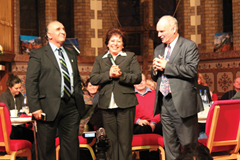Up from the dark: Chilean miner
 A Chilean miner recounts his story of the San José rescue, Peter Cheney reports.
A Chilean miner recounts his story of the San José rescue, Peter Cheney reports.
A first hand account of 2010’s most remarkable good new story was heard, when Chilean miner José Henríquez visited Belfast in February. His occupation would have stirred little attention were it not for his rescue, along with 32 others, after 69 days trapped underground.
Speaking through an interpreter at Willowfield Parish Church, Henríquez explained that 5 August began as a normal working day.
“Around two o’clock, we were all suddenly surprised by a great rock explosion and a massive shock wave that rocked the whole mine and covered us all with dust,” he recalled. Once the dust settled, they found that no-one had been hurt.
The miners were able to find a small shelter and set up some lighting, powered by batteries from destroyed lorries. A box of food and 40 litres of water were gathered up, but they realised they had to organise themselves when some of the men tried to pinch the biscuits.
A democracy, of sorts, was the best way to do that. “We would talk about every decision. Everyone participated and then we’d vote. And 50 per cent plus one would be the deciding factor. We would always, all of us, go with the vote,” he explained. Members who fell out were encouraged to forgive each other, in case they set a bad example.
To conserve their supplies, the groups went on a obligatory fast. Food was rationed e.g. half a teaspoonful of tuna per man each day, which made “delicious soup” when boiled in water. At best, they expected to survive for 15 days.
Around 11,000 litres of industrial water was found in three large tanks: “By faith, we just began to take the first tank. We later discovered that the other two were highly contaminated and we would all have been poisoned.”
Small fissures in the rock allowed some air to circulate but it was “almost like an inferno”. Temperatures were constantly 34°C or higher.
The first day was the worst, with the sense of chaos, and depression quickly set in for some of them. Optimists told them: “Look even if we’re going to die let’s not die negatively.” The second worst day was when the first drill passed them by but they “prayed like mad” when they heard the next one.
They were obviously ecstatic when it hit on 22 August, although another 52 days passed before they reached the surface. Doctors prescribed water and sugar for two days, after which the much-needed food supplies came down the shaft. A tin of peaches from the rations was “in great danger” of being eaten but survived as a momento.
Everyone was given a job and Henríquez, an evangelical pastor, was asked to pray. Many of the miners reportedly became Christians or rediscovered their faith. Henríquez was the twenty-fourth of the 33 to reach the surface. Greeting him, his wife Blanca joked: “This is the longest shift you’ve ever done.”
Asked about the impact of fame, she told the audience: “We’re really very simple people and we don’t want to stop being simple people so we want to try and avoid all that. There’s a Chilean expression: ‘The smoke goes to your head.’ In other words you end up thinking you’re someone special.”
Belfast’s bit
The skills of East Belfast engineers helped to open air shafts during the rescue. Two 28-inch drill bits were made by Hughes Christensen, on the Montgomery Road, but were among its last products. The factory closed early last year with 210 job losses.





